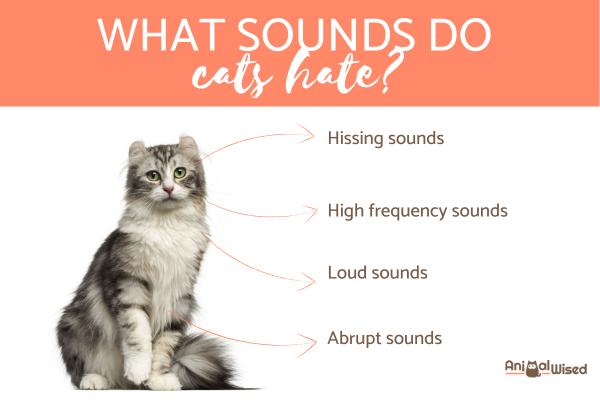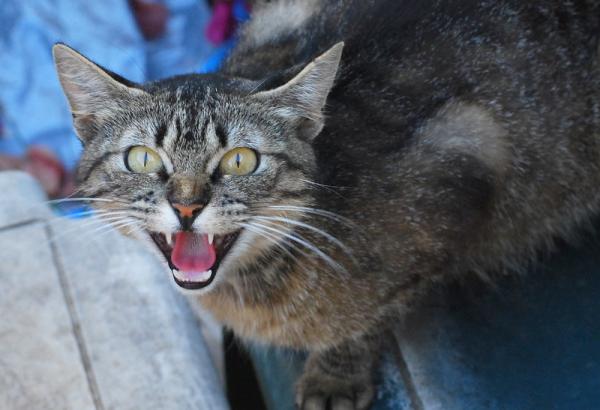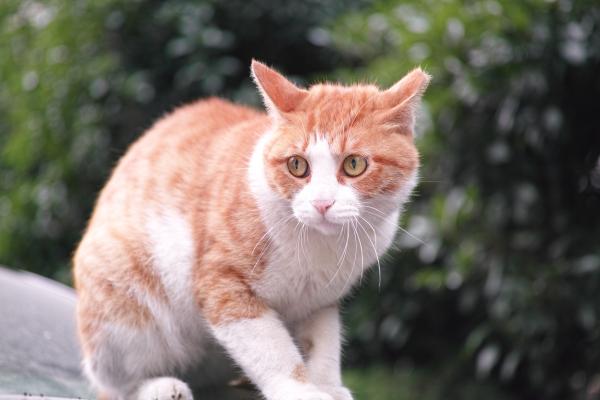
Ever wondered what noises cats hate? There are plenty of sounds that humans can't stand, we can only imagine what they're like for cats since their ears are more sensitive than ours.
In this AnimalWised article we're going to elaborate on what sounds cats hate and why. Continue reading to find out!
What sounds do cats hate?
Cats have a great hearing capacity, much greater to humans. This is why many sounds that don't bother us may bother them. When adopting a cat, we want to create a safe environment where they feel they can relax and enjoy themselves. To create this safe place, we should have an understanding of their basic needs. It will also be helpful to know what sounds cats hate, in order to avoid them in their new home.
These are the sounds that cats hate:
- Hissing
- High-frequency sounds
- Quick, abrupt sounds
- Loud sounds
Keep reading to learn why these sounds bother them so much. We will also go through each one to give you examples and tips on how to avoid them in your household.
A cat's ears are highly sensitive
Did you know that a cat can rotate their ears separately - just like two 'satellites' can. This ability allows them to hear the faintest of noises that help them detect predators and prey. Their external ear is made up of the ear flap and canal; the middle ear, the eardrum and auditory small bones.The inner ear is a complex structure that includes semicircular canals of fluid to help them balance and the cochlea, for hearing.
If you think your dog has exceptional hearing, the capabilities of cat ears will blow you away. Even a clapping sound may be "heard" by a deaf cat. They can supposedly hear sounds from 45 to 60,000 hertz. To put into perspective, humans can only hear from 20 to 20,000 hertz. Actually, any sound above 20,000 is considered ultrasonic - so your cat can hear all sorts of things that you never will.
What sounds do cats hate?
Hissing Sounds
Cats bare their teeth and make hissing sounds when they're scared or feel threatened. Therefore, a hissing sound is generally linked to a dangerous situation or potential conflict with a fellow cat. Spraying aerosols, rustling plastic shopping bags, scrunching up aluminum foil and even a polyester jacket rubbing against something can se your cat off. These all resemble a hiss. So if your cat becomes agitated, aggressive or vocal - that is why. Read our article on how cats communicate to learn more.
High-Frequency Sounds
Cats can hear sounds at a much higher frequency than humans. Because of this, the most minuscule of noises, some which are inaudible to the human ear, can really affect a cat. Some examples are: computer and television screens, fluorescent lightbulbs and remote controls. They can all produce high-frequency, high-pitched, "tinny" sounds that annoy your cat intensely. Watch their reaction when you turn on some electronic devices. When you can, keep the volume at a low level.

Quick, abrupt Sounds
Cats are generally calm, sleep-obsessed pets that detest anything that startles them. Quick, startling sounds like a door bell or a whistle will really shock and agitate them. Likewise, a clap of the hands or a stern "No" is just as alarming and of course a great technique to stop bad behavior.
The cat will likely associate this with something negative, although it is already an unwelcomed sound for them. So, if you consistently make this sound when they are doing something you disapprove of, they should end the habit. Having said this, we always encourage positive reinforcement for all pets. One thing you should avoid as a pet owner is making clicking noises with your mouth. Not only will this confuse them, but really frustrate them. Don't be surprised if you get a paw on your face!
Loud Sounds
We've already established how sensitive cat's ears are, so there is no surprise that loud noises are a no-go. If you want to blast some music, take your cat into a different room where the sounds will be slightly muffled. To your pet, loud music is just an intrusive headache and they won't understand why you would want to do such a thing.
Other loud noises that cats hate (that you don't have much control over) are: sirens, garbage trucks, motorbikes, thunder, and drills. One thing you do have control over is the vacuum cleaner. This is one of the main sounds that cats hate. Similarly, when you are going to clean up your home, do your pet's ears a favor and entice them into another room.
Why do they hate certain sounds?
It's important to say that not all cats will hate every sound we have listed. However, many of them will take a strong dislike to them. And some may even be petrified of them.
For example, sounds similar to a hiss will cause a cat’s ears to prick up because this is a territorial or defensive sound made by another cat. Of course, this will make the cat in question very alert.
There are of course other factors that determine how much a cat will detest or tolerate a sound. Perhaps they have inherited some dislike towards specific sounds from their parents. Or, a certain sound can remind them of a traumatic experience. It could also be a hard-wired trait that goes back to the evolution of the species.

Some tips
Cats are pretty tolerant of most sounds but peace and quiet is most definitely preferred. Let's recap on the main sounds cats hate and therefore you should avoid:
- Sounds similar to hiss sounds: such as the sound of plastic bags being rustled. Perhaps you can try use reusable fabric bags when you go shopping.
- Vacuum cleaner: these are loud, intrusive and can seem never-ending. We recommend you take your cat to another room whilst you vacuum.
- Motorbikes, engines, fireworks: anything loud. Of course you cannot control who drives past your home. But perhaps keep windows closed in places where your cats like to lie down.
- High frequency sounds: like fluorescent lightbulbs and LCD display. Avoid them when possible.
- Clicking mouth noises: this is probably the easiest one to avoid, so implement it right away.
If you avoid these irritating sounds and provide your feline with a calm environment, you will have a happy cat. We encourage you to discover some pleasant music for cats or dabble in some classical music - you may find it is a genre you will love just as much as them!
If you enjoyed this informative article, you will like 10 smells that cats hate and 5 things your cat hates about you.
If you want to read similar articles to What Sounds Do Cats Hate?, we recommend you visit our Facts about the animal kingdom category.